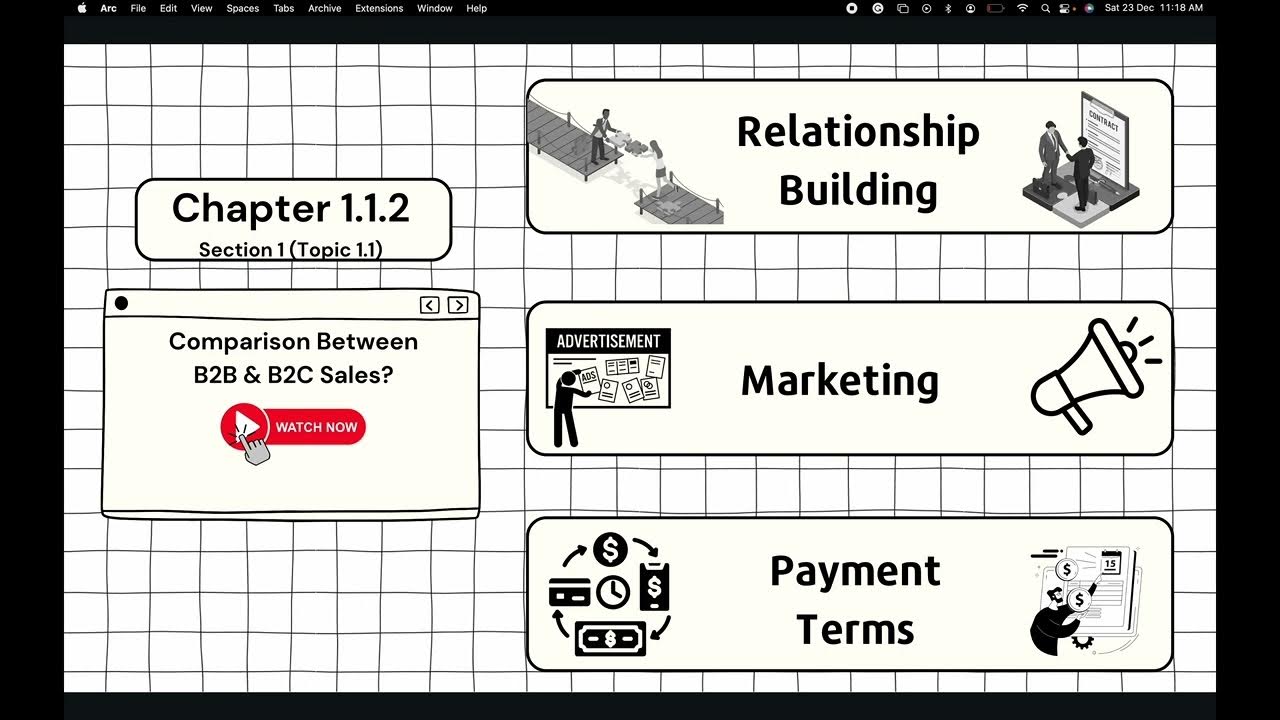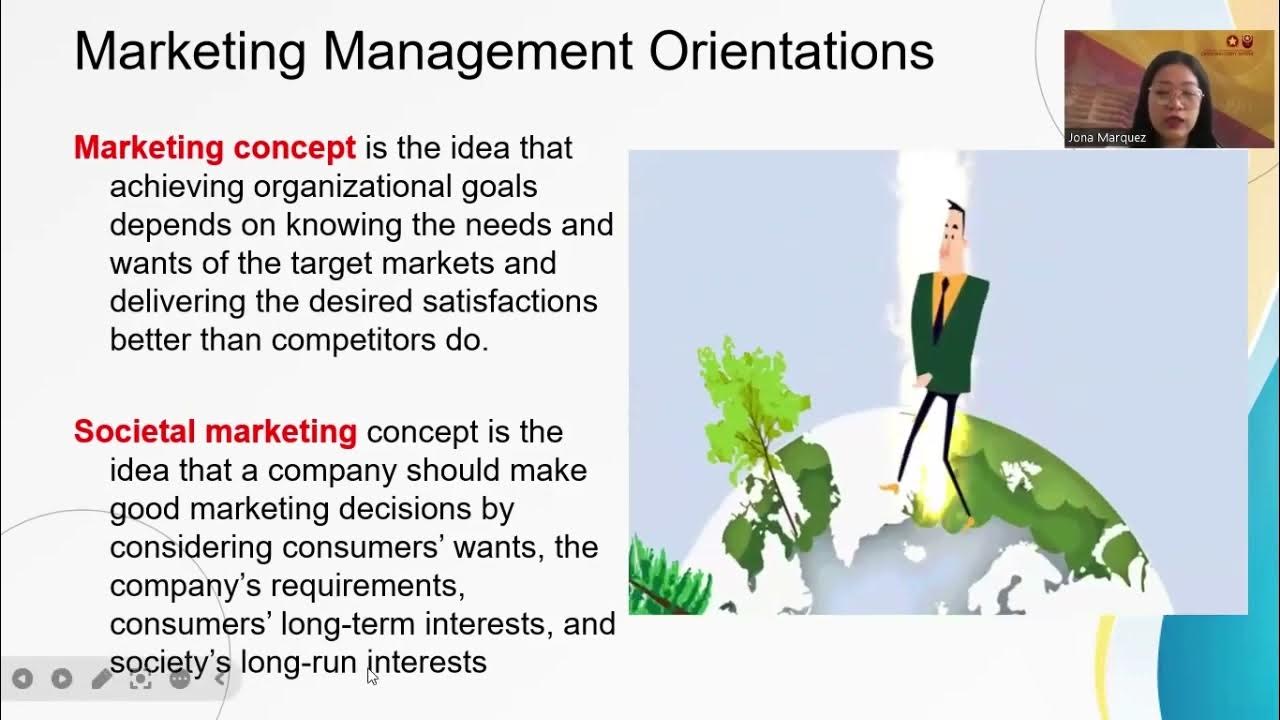Lec 15- Understanding Organizations as Customers-3
Summary
TLDRThis video script delves into the intricacies of business marketing, focusing on developing effective marketing programs and managing B2B relationships. It covers transitioning from product to solution selling, enhancing services, building B2B brands, overcoming price pressures, and managing communications. The module also explores the unique aspects of institutional and government markets, offering insights into the dynamics of supplier and buyer relationships and the importance of trust, credibility, and reputation in business dealings.
Takeaways
- 📈 **Developing Business Marketing Programs**: The script emphasizes the importance of creating effective business marketing strategies that transition from product-focused to solution-oriented approaches.
- 🤝 **Managing B2B Relationships**: Understanding and classifying buyer-seller relationships is crucial for managing corporate trust, credibility, reputation, and operationalism in business.
- 🛠️ **System Selling**: The concept of system selling, where a single supplier provides a total problem solution, is highlighted as a key marketing tool, especially in industrial marketing strategy.
- 🔄 **Transition to Services**: There's a clear trend in business where products are transitioning into services, with companies like Rolls-Royce offering long-term repair and maintenance contracts for added value.
- 💼 **Enhancing Services**: High-quality services are being added to product offerings to provide greater value and establish closer ties with customers, as seen with companies like Adobe Systems.
- 🏢 **Building B2B Brands**: The significance of brand recognition in business-to-business marketing is underscored, with brands like ABB undergoing rebranding to strengthen their market position.
- 💬 **Overcoming Price Pressures**: Various strategies are discussed to counter price-oriented buyers, including user framing, total cost of ownership, and emphasizing the value of services.
- 📊 **Economic Value Analysis**: A tool for monetizing the functional benefits of a company's offering is introduced, which helps communicate the value proposition to customers more effectively.
- 🌐 **Managing Communication**: The role of online communication, including SEO and social media, in B2B marketing is highlighted, with examples of companies leveraging these channels for better performance.
- 🤔 **Understanding Buyer-Supplier Relationships**: The development of relationships between business partners is influenced by factors such as availability of alternatives, supply importance, and market dynamism.
- 🏦 **Institutional and Government Markets**: Specific features of institutional and government buying practices are discussed, including the preference for lowest bidder contracts and the need for detailed guidelines for suppliers.
Q & A
What is the main focus of Module 15 in the 'Introduction to Marketing Essentials' course?
-Module 15 focuses on developing effective business marketing programs, managing B2B relationships, understanding buyer-seller dynamics, and managing corporate trust, credibility, reputation, risk, and operationalism in business.
What is the difference between individual customers and organizational customers?
-Individual customers are single consumers making purchases for personal use, whereas organizational customers are entities such as businesses or institutions that make purchases for commercial, industrial, or institutional use.
What is the concept of 'system buying' and how did it originate?
-System buying is a practice where business buyers prefer to purchase a total problem solution from one seller. It originated with government purchases of major weapon and communication systems, where prime contractors were responsible for assembling the systems from subcomponents provided by second-tier contractors.
How do technology giants like HP, IBM, Oracle, and Dell adapt to the shift to cloud-based services?
-These technology giants are transitioning from specialists to One-Stop shops, providing the core technology necessary as businesses shift to the cloud, often by adding systems selling as a marketing tool.
What is 'system contracting' and how does it benefit both the supplier and the customer?
-System contracting is a single supplier providing the buyer with all its maintenance, repair, and operating (MRO) requirements during the contract period. It benefits the customer by reducing procurement and management costs and offering price protection, while the seller achieves lower operating costs due to steady demand and reduced paperwork.
How does Rolls-Royce enhance its services to provide greater value to customers?
-Rolls-Royce enhances its services by offering long-term repair and maintenance contracts for its jet engines, which not only provides a source of profit but also gives customers peace of mind and predictability.
What is the significance of the subscription model in the context of digital marketing businesses like Adobe Systems?
-The subscription model eliminates the need for constant persuasion for users to upgrade to newer versions, as upgrades happen automatically. It also increases revenue as companies can sell support services to their cloud customers.
Why is building a strong corporate brand important in B2B marketing?
-A strong corporate brand provides assurance of product quality, making it easier to justify purchases to stakeholders. It also helps in establishing trust and can be a key differentiator in the marketplace.
How can companies counter requests for lower prices in B2B transactions?
-Companies can counter price requests by demonstrating the total cost of ownership, highlighting superior services, showcasing supplier knowledge and ability to improve customer time to market, and using economic value analysis to monetize the functional benefits of their offerings.
What is the role of communication in managing B2B relationships?
-Communication is crucial for informing business customers about the benefits of offerings, coordinating activities with collaborators, and moving into the online space using SEO, SEM, social media, webinars, and other digital tools to connect with buyers.
How do institutional and government markets differ from other B2B markets in terms of purchasing practices?
-Institutional and government markets often require suppliers to submit bids and may award contracts to the lowest bidder, with allowances for quality or timely completion. They also involve more paperwork, public review, and bureaucracy, with a focus on cost justification and past performance.
Outlines

Cette section est réservée aux utilisateurs payants. Améliorez votre compte pour accéder à cette section.
Améliorer maintenantMindmap

Cette section est réservée aux utilisateurs payants. Améliorez votre compte pour accéder à cette section.
Améliorer maintenantKeywords

Cette section est réservée aux utilisateurs payants. Améliorez votre compte pour accéder à cette section.
Améliorer maintenantHighlights

Cette section est réservée aux utilisateurs payants. Améliorez votre compte pour accéder à cette section.
Améliorer maintenantTranscripts

Cette section est réservée aux utilisateurs payants. Améliorez votre compte pour accéder à cette section.
Améliorer maintenantVoir Plus de Vidéos Connexes

industrial marketing management

What is B2B Marketing? | From A Business Professor

Comparison between B2B and B2C sales

Topic 1 - Marketing Managing Profitable Customer Relationships

Lec 05- Developing Successful Marketing and Organizational Strategies

Karakteristik dan Strategi Business to Business - Market Think #46
5.0 / 5 (0 votes)
